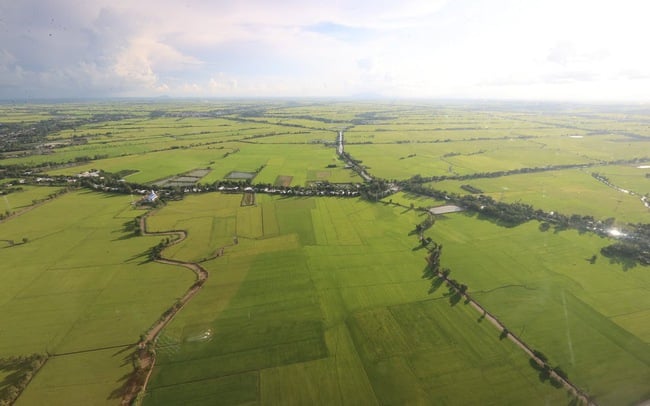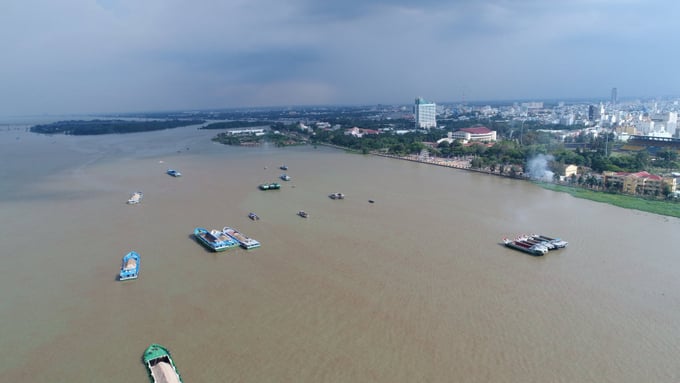May 21, 2025 | 10:01 GMT +7
May 21, 2025 | 10:01 GMT +7
Hotline: 0913.378.918
May 21, 2025 | 10:01 GMT +7
Hotline: 0913.378.918
Recently, at the Routable Dialogue titled "Joining forces for a sustainable transformation of the Mekong Delta," policymakers and experts from Vietnam and the Netherlands presented a series of solutions on integrated planning, infrastructure and logistics development, and effective use and management of water in order to promote the sustainable development of agriculture in the Mekong Delta. In which the growth in harmony with nature is emphasized.
Vietnam's Mekong Delta is a major agricultural development region, providing 32 percent of the agricultural sector's GDP, maintaining national food security, and exporting agricultural goods. The production capability of the entire region accounts for 50 percent of rice production, 65 percent of aquaculture production, 70 percent of fruit production, 95 percent of rice exports, and 60 percent of fish exports. It is also home to several internationally renowned agricultural products and provides numerous input materials for the industrialization and modernization of the southern area and the entire nation.

The Mekong Delta is a key agricultural development area of Vietnam. Photo: TL.
The Party and Government have issued numerous policies on agricultural and rural development in the Mekong Delta, thereby fostering production in the region to make much progress.
According to Dr. Tran Cong Thang, director of the Institute of Policy and Strategy for Agriculture and Rural Development (IPSARD), the agricultural system of the Mekong Delta has undergone a clear transformation in recent years, with a significant reduction in the area of rice cultivation and a greater allocation of resources to higher-value crops. In addition, the area of fruit trees and aquaculture has expanded over the past five years, forming large-scale specialized farming areas and bolstering the confluence between business and farmer. This transformation highlights the direction of the region's adaption development to climate change.
Nonetheless, the Mekong Delta is confronted with obstacles and related issues, such as structural modification that readily causes subsidence, saltwater intrusion, and landslides; The development of the shrimp and pangasius markets has been hindered by stringent regulations and standards, leading to fierce competition in the quality of agricultural and aquatic products; the development of science and technology 4.0 places greater demands on high-quality human resources; a synchronous policy is required to strengthen the state's management capacity and create conditions for enterprise participation.
IPSARD leaders proposed key solutions in the orientation of agricultural transformation in the Mekong Delta, including respecting the laws of nature, being suitable to actual conditions, and avoiding robust interference on nature; proactively adapting, promoting potentials and strengths, transforming challenges into opportunities in the context of climate change; putting ecological agriculture as the focal point, the enactment of ecological agriculture policies, and the implementation of ecological agriculture policies.
Mr. Tran Thanh Nam, Deputy Minister of Agriculture and Rural Development, echoed the views of the Government and the Ministry of Agriculture and Rural Development that sustained agricultural transformation must be founded on the naturalistic concept. The regions of saltwater, brackish water, and freshwater in the Mekong Delta are considered exploitable resources.
"Our perspective is to manage salt water rather than prohibit it; we consider it as an exploitable resource." To achieve this, investment in irrigation infrastructure must be encouraged. Mr. Tran Thanh Nam stated, "We are concerned with two issues: continuing to build and improve irrigation infrastructure to manage brackish, salty, and freshwater areas suited for each region's output, and reorganizing production for farmers."
Concerning the management, exploitation, and use of water resources in the Mekong River Delta, Dr. Nguyen Anh Duc from the Institute of Water Resources Science (Ministry of Natural Resources and Environment) stated that water resources in the Mekong Delta are impacted by numerous factors, including Chinese hydropower on the Lan Thuong River, hydropower in the lower Mekong basin, water transfer into and out of the basin, development of irrigation, and water use for industry and daily life.

Water is a resource and a key development driver for the Mekong Delta.
The representative of MONRE offered two non-structural and structural solutions for the management and use of water resources in the Mekong Delta for economic and agricultural growth in the region. Consequently, it is necessary to complete the system of works on the exploitation and use of fresh water in the interior in sync with the works on the canal system and sub-regional works; proactively control salinity to both effectively use saltwater for aquaculture and to reduce the impact of saltwater intrusion on agricultural production (rice, edible crops, vegetables, industrial crops), livestock, and domestic water supply for coastal people; and building so-called "reservoirs" for freshwater storage.
Representatives of the Dutch expert group, Dr. Gerardo van Helsema, Dr. Peter Smeets, and Mr. Martijn van de Groep, presented scientific proposals regarding water and agriculture, as well as the establishment of an agricultural products distribution hub in the Mekong Delta.
According to a panel of specialists, the Mekong Delta area should restrict the usage and overexploitation of groundwater during the dry season in order to prevent water loss, maintain water quality in the region, and utilize water for aquaculture. The Mekong Delta must also pay concerns to efficiency. Numerous programs and initiatives are required to investigate drought-tolerant plant types, innovative technical processes in crop restructuring, avoidance of riverbank and coastal erosion, construction of biodiversity corridors, and improvement of cooperatives' climate change adaptation ability.
Translated by Linh Linh

(VAN) In 2024, over 295 million people across 53 countries and territories faced acute hunger—an increase of almost 14 million people compared to 2023, while the number of people facing catastrophic levels of hunger reached a record high.

(VAN) World Environment Day 2025 (June 5) carries the theme 'Beat Plastic Pollution' continuing to emphasize the global urgency of addressing the plastic waste crisis.

(VAN) This was the assessment shared by experts at the workshop titled 'Assessing the Role and Potential of Low-Emission Rice Production Systems in Vietnam,' held on the morning of May 19.

(VAN) Cai Rong Port is the fisheries control center of Quang Ninh, helping to monitor fishing vessels, combat IUU fishing, and remove the EC's 'yellow card'.

(VAN) The German Agricultural Society (DLG) explores the possibility of establishing a mechanization service center in Vietnam’s Mekong Delta to support farmers in accessing and utilizing advanced machinery.

(VAN) On May 16, the Department of Water Resources Management, in collaboration with the Food and Agriculture Organization of the United Nations (FAO), held a signing ceremony for the GEF-8 project document.

(VAN) Food safety, mechanization, vocational training, and market opening are key areas of cooperation expected between the Vietnamese Government and the Federal Republic of Germany.